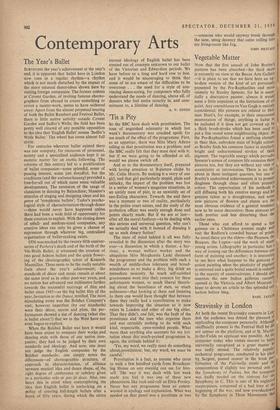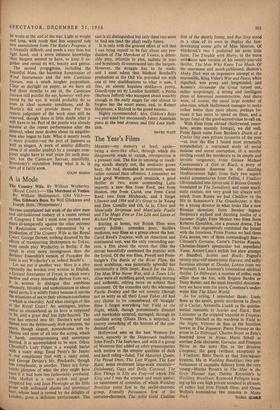Stravinsky in London
AT both the recent Stravinsky concerts in Loa: don the audience was denied the pleasure applauding the composer personally. Although unofficially present in the Festival Hall he did not appear on the platform, and at St. Martin' in-the-Fields no applause was possible. As the composer today who comes nearest to being universally recognised as a great master he was sadly missed. The relatively popular orchestral programme, conducted in his place by Sargent, passed muster in the brisk per formance of the Pulcinella music and the conscientious if slightly too personal one of the Symphony of Psalms, but the composer was badly needed on the rostrum for the, Symphony in C. This is one of his neglected masterpieces, composed at a had time at the beginning of the war, and now overshadowed by the Symphony in Three Movements that he wrote at the end of the war. Light in weight and tone, with much that has acquired rich new associations from The Rake's Progress, it is formally difficult, and needs a very firm but light hand, and a more intimate knowledge than Sargent seemed to have, to keep it to- gether and reveal its wit, beauty and genius.
The second progr6mme, including the beautiful Mass, the haunting Symphonies of Wind Instruments and the new Canticum ,Sacrum, was a much tougher proposition. Clear as daylight on paper, as we have all had three months to see in, the Canticum S'acrum still puzzles the ear, however well pre- pared by the eye. It would probably do so even in ideal acoustic conditions, and St. Martin's did not provide those. For this reason judgement of the work must still be reserved, though there is little doubt what it Will have to be. Part of the puzzle was already soluble at the repeat performance after the interval, when most doubts about its singable- !less also began to fade. What it mostly needs is more practice—on the part of listeners as well as singers. A work of similar difficulty (even if of similar quality) by a younger com- poser might have to wait years for such prac- tice, but the Canticum Sacrum, mercifully, Stravinsky's reputation being what it is, is sure of it fairly soon.
COLIN MASON



































 Previous page
Previous page